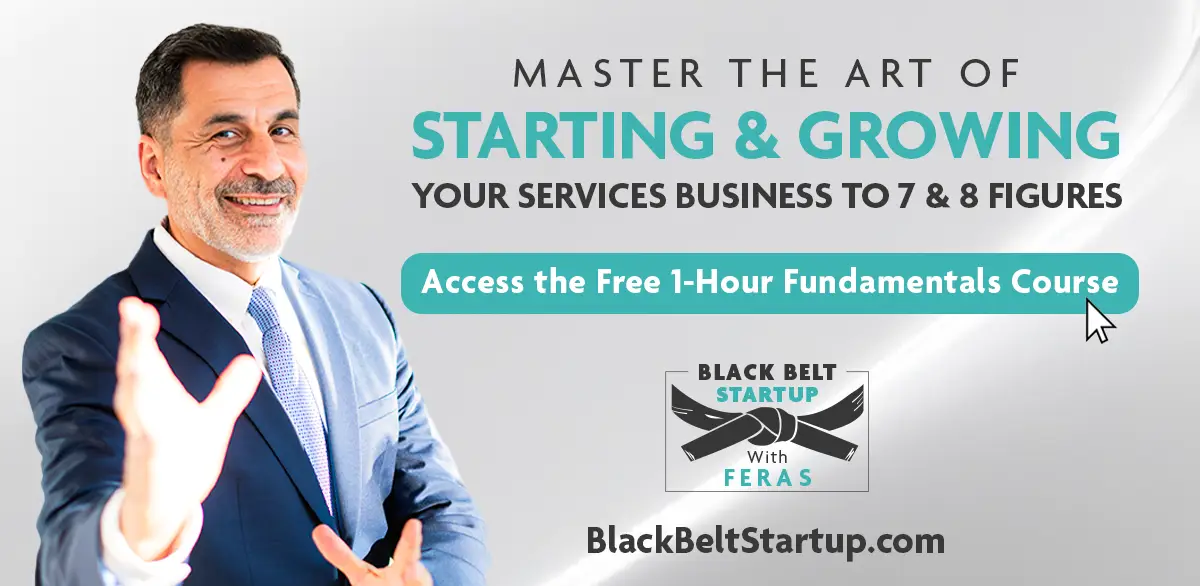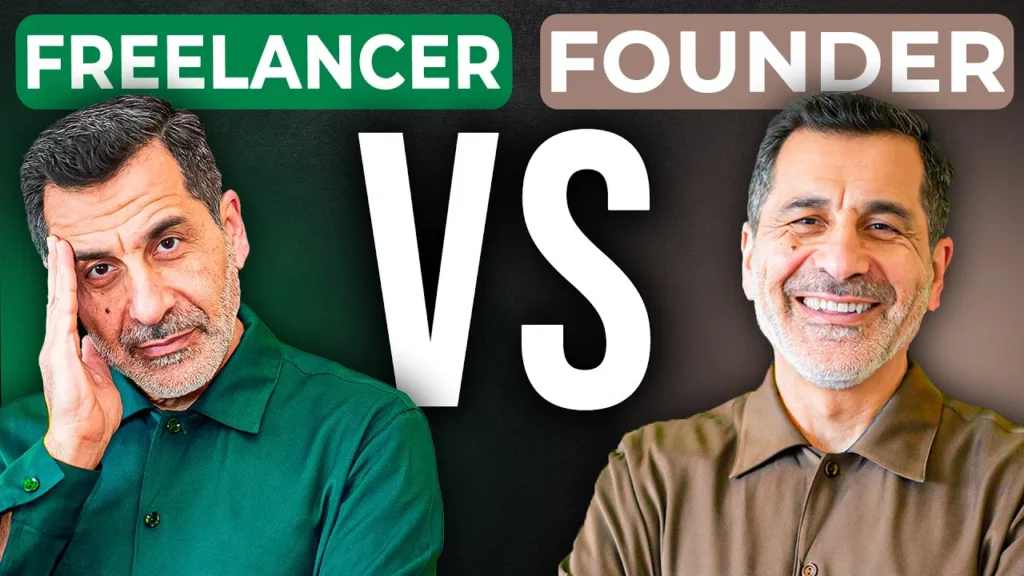Freelance vs Full-Time: Which Career Path is Right for You?

Your alarm rings. It’s Monday morning again, and you’re already counting down to Friday. You’re tired of feeling stuck, wishing for more freedom, more money, or simply more control over your life. Imagine if every day felt like Friday instead.
Freelancing promises the freedom you crave, side hustling could bring in extra cash, and entrepreneurship offers the ultimate adventure. But before you tell your boss “goodbye forever,” let’s make sure you’re choosing the right path when it comes to freelance vs. full-time (9-to-5) work that matches who you truly are (and avoids a very awkward conversation with your current boss).
I speak with anywhere from 50 to 100 service-based founders and freelancers every year. The biggest mistake I see isn’t a lack of ambition; it’s picking the wrong path simply because it sounds like the next step.
So what are your real options, and what does each path actually look like in practice?
The Four Career Scenarios – Pros & Cons of Each
Figuring out the right path to independence isn’t as simple as choosing between freedom and stability. In fact, the perfect fit is often hidden in overlooked details. Let’s carefully explore four scenarios, highlighting insights most people miss, so you can confidently find what suits you best. We’ll cover just being a full-time employee, adding on a side hustle, freelancing full-time, and taking things to the next level as an entrepreneur (starting a business).
Scenario 1: Full-Time Job Only
Pros of being a full-time (9-to-5) employee:
- Predictable paycheck:
Knowing exactly how much money hits your bank every month offers more than just comfort; it gives you mental bandwidth. You’re not constantly worrying about your next invoice getting paid, which means you can focus your energy on building skills, exploring ideas, or testing a side hustle without panic. Job security, a set work schedule, and predictable income provide a stable foundation that makes it easier to take smart risks, like investing in a course, building a personal brand, or lining up freelance clients before making a leap. - Employee benefits:
Health insurance, paid vacations and holidays, and retirement plans aren’t flashy, but their value becomes clear the moment you step away from them. Many new entrepreneurs underestimate how crucial these hidden perks are, leaving too soon and regretting it later. Staying in your job until you’re financially and emotionally ready can save you from expensive mistakes.
Cons:
- Limited Freedom:
Working full-time often means following someone else’s rules, schedules, and goals. Over time, if you’re not challenged, learning, and advancing, this comfortable routine can quietly drain your creativity, making it difficult to break free and pursue your own vision. Staying comfortable for too long has a hidden cost: it slowly dulls your entrepreneurial instincts. - Capped Earnings:
No matter how talented you are, traditional jobs set limits on your earnings. I’ve seen ambitious coworkers push harder every year, sacrificing weekends and evenings, only to hit salary ceilings. Their hard work rarely translated into meaningful financial growth. There’s an invisible ceiling in traditional jobs that few executives and managers openly discuss.
The Mid-Career Income Plateau Is Real
Most traditional jobs cap your earning potential by your mid-forties. According to SmartAsset, median weekly earnings for individuals in the U.S. aged 45–54 hover around $1,336. That’s roughly $69,000 a year. Advancement slows, raises become incremental, and breaking past that ceiling often requires a leap into entrepreneurship.
Scenario 2: Full-Time Job + Freelancing (Side Hustling)
Pros of having a side hustle:
- Extra Income and Skill Development:
Adding freelance clients on the side is often celebrated for the extra money, but there’s far more to gain. A side hustle can become your personal business bootcamp. You’ll learn how to market yourself, sell your services, manage client expectations, negotiate deals, and deliver results, all in real time. These aren’t just nice-to-have skills; they’re the foundation of every successful consulting or service business. - Safe Testing Ground:
Many suggest focusing exclusively on one thing, but sometimes, multitasking strategically can protect your future. Imagine someone who quietly experimented with different freelancing niches while employed, learning exactly what services clients would pay top dollar for. This could allow them to safely launch a profitable social media consultancy without financial stress.
Cons:
- Work-Life Imbalance and Burnout:
Many people I speak with fall into the trap of thinking side hustles will quickly lead to financial freedom. They pour in hours after their 9–5, chasing the idea that hard work alone will create fast results. But more hours don’t always mean more progress. When the results don’t come fast enough, and they usually don’t, burnout creeps in. Energy fades, motivation drops, and both the full-time job and the side hustle start to suffer. The smarter move? Treat your side hustle as a focused, time-bound experiment, not a permanent grind. - Slower Overall Growth:
Splitting attention between two careers often means neither gets your best effort. If your goal is to build a successful consultancy, side hustling too long will slow down the real progress you’re capable of making.
Scenario 3: Freelancing as a Full-Time Solopreneur
Pros of being a full-time freelancer:
- Flexible Schedule & Unlimited Potential:
Freelancing gives you complete control over your schedule and income potential. You can also work from home, a coffee shop, or wherever you choose. More importantly, it accelerates personal discipline and responsibility. Let’s talk about Matt, who began freelancing in copywriting. He mastered the discipline of managing demanding clients on his own schedule. Those self-management skills allowed him to rapidly grow into a successful consulting business. - Immediate Market Feedback:
Freelancing forces you to quickly learn what works and what doesn’t, as real clients will immediately show you through their feedback (or lack of bookings). Many freelancers spend months planning perfectly instead of just letting the market speak. Those who start quickly gain real-time insights, refine their offering faster, and succeed earlier.
Cons:
- Feast or Famine – Financial Uncertainty & Client Dependence:
Even highly paid freelancers can find themselves in trouble if they don’t plan strategically. You might be Jenny, a graphic designer earning six figures, but constantly stressed from chasing one-off projects just to keep income flowing. Things changed when she stopped relying on short-term gigs and started building a steady pipeline. She focused on one niche, refined her messaging, and actively showed up where her ideal clients already were: LinkedIn, small business forums, and local meetups. By offering value upfront and creating simple packages with monthly retainers, she went from unpredictable income to consistent, dependable client relationships. - Isolation & Admin Overload:
Freelancers often underestimate how isolating working alone can become. Administrative tasks such as invoicing, taxes, and follow-ups quietly consume time and mental energy, pulling you away from the profitable client work you love.
Scenario 4: Full-Time Entrepreneurship (Building a Business)
Pros of entrepreneurship:
- Scalability Beyond Hours:
Entrepreneurship allows growth beyond the limits of your personal time. However, rushing to hire too soon often backfires. Simon, an SEO consultant, initially hired a team quickly but saw profits suffer. Only after building clear processes and repeatable systems did his business thrive, doubling profits within one year. Sustainable growth always begins with structure, not rushed hiring. - Meaningful Impact:
Running your own service-based business means your daily effort directly creates meaningful results for clients. You’re no longer trading hours for dollars; you’re delivering genuine value, solving real problems, and making an impact beyond yourself.
Cons:
- High Responsibility & Financial Risk:
Entrepreneurship comes with intense pressure that many underestimate. In my first consulting venture, I nearly lost it all by overlooking how long acquiring new clients could take. Stepping into entrepreneurship without fully preparing emotionally, financially, and strategically (and getting the support of those who depend on you) often leads to painful setbacks. - Time Commitment & Delayed Gratification:
Many people glorify entrepreneurship without talking about the patience required. Building your own business rarely provides quick rewards. Imagine an HR consultant who faced months of slow growth and almost quit. However, by listening carefully to client feedback, committing to content marketing and thought leadership knowledge sharing, and staying patient, he became a recognized leader in his field. Success in entrepreneurship often goes to those willing to wait and adapt.
Understanding What’s Right for You: 5 Key Questions
Many new entrepreneurs and freelancers pick career paths based on what’s popular (or the latest YouTube claim :)) rather than what’s truly right for them. Before deciding between freelance vs full-time, honestly ask yourself these five key questions. They’ll help you find clarity by cutting through the noise and common advice.
Q1 – What’s Your Personality Type?
Your personality shapes everything, from dealing with stress to handling clients, yet this crucial factor is often ignored.
Here’s a quick, clear way to know your personality using the DISC method:
- Dominance (D) – Bold, direct, decisive. You thrive under pressure and love getting results quickly.
Best Fit: Entrepreneurship or freelancing roles requiring quick decisions and assertiveness. - Influence (I) – Friendly, outgoing, persuasive. You naturally build connections and excel in roles focused on people and relationships.
Best Fit: Consulting, coaching, or sales-oriented freelance or entrepreneurial roles. - Steadiness (S) – Calm, patient, supportive. You prefer stability, routine, and clear expectations.
Best Fit: Stable full-time roles or freelancing with predictable, steady client projects. - Compliance (C) – Analytical, precise, structured. You love accuracy, planning, and details.
Best Fit: Highly specialized freelancing (finance consulting, analytics) or structured full-time roles.
For example, imagine yourself to be Sasha, who was naturally outgoing and persuasive yet spent years feeling drained in a detail-heavy spreadsheet analysis role.
Switching to freelance business coaching, where she was able to leverage her strengths, tripled her income in a single year.
Q2 – How Important Is Work-Life Balance to You?
Many entrepreneurs glorify hustle and constant work, but the reality is more complex and far less glamorous.
- Freelancing:
While freelancing offers flexibility, that same freedom often blurs the line between work and personal life. You’re technically “free,” but always available answering emails at midnight, squeezing in client work during dinner, and never really switching off. Mike, a freelance marketing consultant, found himself constantly on edge, pulled between tasks and texts, unsure when his workday ended or his personal time began. What was meant to feel freeing slowly started to feel like being on call 24/7. - Entrepreneurship:
Starting a business can consume nights and weekends, quickly taking priority over family and personal time. When I launched my consulting business, I underestimated how much family time entrepreneurship would truly cost. Only by clearly defining my personal priorities did I regain a sense of balance and sanity. - Full-time Employment:
A traditional job may lack excitement, but clear boundaries and predictable schedules can protect your health and well-being, something many people undervalue until they’re exhausted.
Consider carefully. Do you genuinely prefer flexibility with unpredictability? Or does structured balance sound more your style? Maybe something in between? The freelancer lifestyle isn’t always a good fit for everyone.
Q3 – Do You Thrive on Uncertainty and Problem-Solving?
Not everyone enjoys uncertainty. Freelancing and entrepreneurship require constant adaptability and creative problem-solving skills.
- Freelancing & Entrepreneurship:
These paths are not always easy. Being a freelancer or an entrepreneur, you need to realize that things can change fast, and you have to be ready to adjust. You’ll face new problems often and need to figure them out quickly. Some people love that challenge. Take Priya, for example. She’s a strategy consultant who didn’t panic when things got hard. She switched industries, found new clients, and kept moving forward—even when others got stuck. That’s what helped her grow fast and build a name for herself. - Full-time Employment:
Having a regular job gives you a steady routine. For some people, that structure feels safe, and that’s a good thing. It helps you grow, stay focused, and feel secure. But there’s a catch: if your job isn’t helping you learn or get better, that same routine can start to hold you back. A steady paycheck is great, but if you’re not growing, you’re just stuck in place. Ask yourself: Am I just showing up… or actually leveling up?
Q4 – Are You Financially Prepared for Risk?
Freelancing and entrepreneurship involve financial risks that many underestimate until it’s too late.
- Freelancing:
Income often fluctuates unpredictably. Without savings, a single slow month can send you into panic mode. John, a freelance software consultant, nearly quit freelancing after losing his biggest client unexpectedly, simply because he hadn’t built a financial safety net beforehand. - Entrepreneurship:
Launching a business involves upfront investment in tools, marketing, and hiring. And that’s just the beginning. It may take months before you generate consistent revenue, and even then, your profit margins may be thin at first. Without solid financial preparation, what starts as an exciting dream can quickly become an overwhelming source of stress.
Think realistically: Are you ready financially and emotionally for the ups and downs ahead?
Q5 – Are You Following an Opportunity or Making One Up?
One common mistake freelancers and entrepreneurs make is diving into a service they’re passionate about without confirming that real people will pay for it.
Make Sure People Want What You’re Offering
Being passionate is great, but it’s not enough to build a business around. If no one wants what you’re selling, it won’t matter how much you love doing it.
Before you dive in, ask yourself:
- Are people already paying for something like this?
- Are they actively searching for a solution to this problem?
- Have I heard this need come up often in conversations, forums, or communities?
If the answer is no, pause and do more research, don’t assume demand, prove it. Start small and offer a simple version of your service and see if anyone will pay for it. If they are, you’re on the right track. If not, adjust. Passion should guide your direction, but demand decides if it’s worth turning into a business.
This is where freelancing can play a powerful role, if you’ve validated your idea and the demand is there, freelancing is one of the safest and most effective ways to test and grow it. But it’s not the final destination. It’s the bridge, the training ground for something bigger: building a business that grows beyond you.
To make that leap with clarity, there’s one important distinction you need to understand next.
Why Freelancers Often Aren’t Considered Founders
It’s easy to confuse freelancing with entrepreneurship, but they’re not the same.
Freelancers Trade Hours for Money
Like employees, freelancers depend entirely on their personal effort. There’s a hard limit on how many clients they can handle at once, no matter how talented they are. Julia, an independent marketing consultant, made excellent income but found herself unable to relax, even on vacation. Clients always needed her immediate attention. The moment she stepped away, everything paused. Without realizing it, Julia had built herself a job, not a business.
Businesses Scale with Systems, Not Hours
True entrepreneurs build businesses that run smoothly, even when they’re not around. They create clear processes, hire trusted teams, and use smart automation. When you run a genuine business, stepping away for a week won’t cause chaos. If it can’t function without you, it’s not a business, it’s a roadblock with your name on it.
The Freelancer’s Stepping-Stone Strategy
Freelancing doesn’t have to be your end goal. In fact, it’s the perfect stepping stone toward real entrepreneurship—if you plan wisely.
Strategic Steps from Freelancer to Business Owner:
1. Deliver Exceptional Value:
Go above and beyond with every client. Exceptional freelancers naturally attract loyal clients who’ll later trust you enough to become your biggest advocates, making your transition into business ownership seamless.
2. Systematize Early:
Don’t wait until you’re overwhelmed. Document your processes from day one. Write down exactly how you onboard new clients, handle projects, or deliver reports. By doing this early, scaling your business with additional team members or automation becomes much simpler.
3. Leverage Freelance Platforms Strategically:
Platforms like Upwork or Fiverr can be powerful tools to help you get work initially, but relying on them forever is risky. Mark, a financial consultant, initially used Upwork to find clients and prove that his service was in demand. Once established, he strategically transitioned off the platform. Today, 90% of his income comes directly from clients he personally attracted, keeping him secure and independent.
Key Takeaways and Actions
Freelance vs. full-time isn’t just a career choice, it’s a strategy. Whichever path you choose, the goal is the same: long-term success, not short-term survival. But that path looks different depending on your skills, goals, and mindset.
To move beyond trading hours for dollars and build a service business that actually lasts, consider these essential actions:
- Clarify your career path early: Don’t blindly follow trends. Take time to understand your personality, financial situation, and comfort level with uncertainty. Whether you thrive on structure or crave flexibility, aligning your career choice with your natural strengths leads directly to greater satisfaction and success.
- Use freelancing strategically as a testing ground: Freelancing shouldn’t be your endpoint; see it as your business laboratory. Experiment safely with different service offerings, pricing models, and markets. Pay close attention to what resonates with clients, and build your future business around that proven demand.
- Start building systems from day one: Even as a solo freelancer, document your processes early. Invest in simple tools, project management apps, automated invoicing, and customer relationship management software that allow you to scale easily when the time is right. Systems help you move from being the business to running the business.
- Develop a stable client base beyond freelance platforms: Platforms like Upwork or Fiverr are excellent launchpads, but relying on them forever limits your growth potential. Start creating your own steady flow of clients by building your professional network, asking for referrals, and creating content that positions you as a trusted expert.
- Price strategically—charge for value, not hours: Move beyond hourly billing as soon as possible. Structure your pricing around the real results you provide, ensuring clients see your true value clearly. Value-based pricing allows you to earn more while freeing you from constantly chasing your next gig.
- Prepare financially for the leap into entrepreneurship: Freelancing and entrepreneurship both carry financial uncertainty. Build a safety net early to avoid panic during slow periods. Plan your finances strategically, creating stability so you can confidently transition from freelance projects to sustainable business growth.
By implementing these key strategies, you’ll turn freelancing from a temporary hustle into a powerful stepping stone toward lasting entrepreneurship. Remember, clarity, preparation, strategic action, and adaptability are your greatest tools for success.




